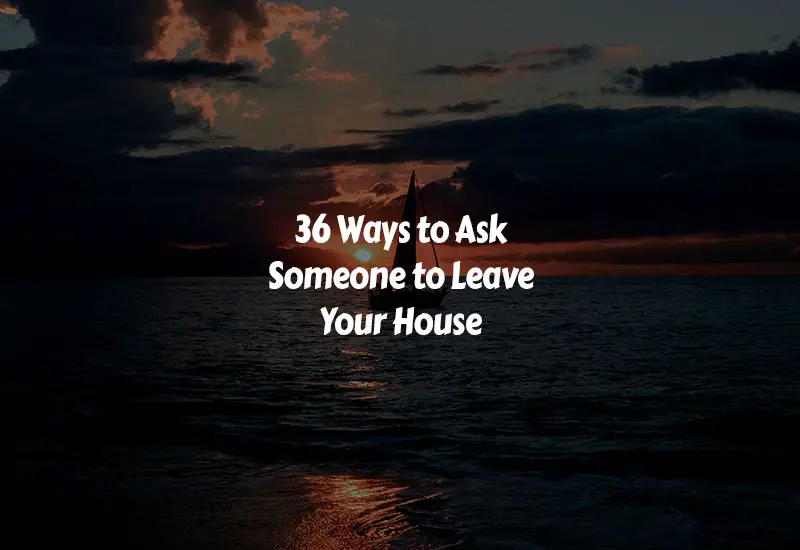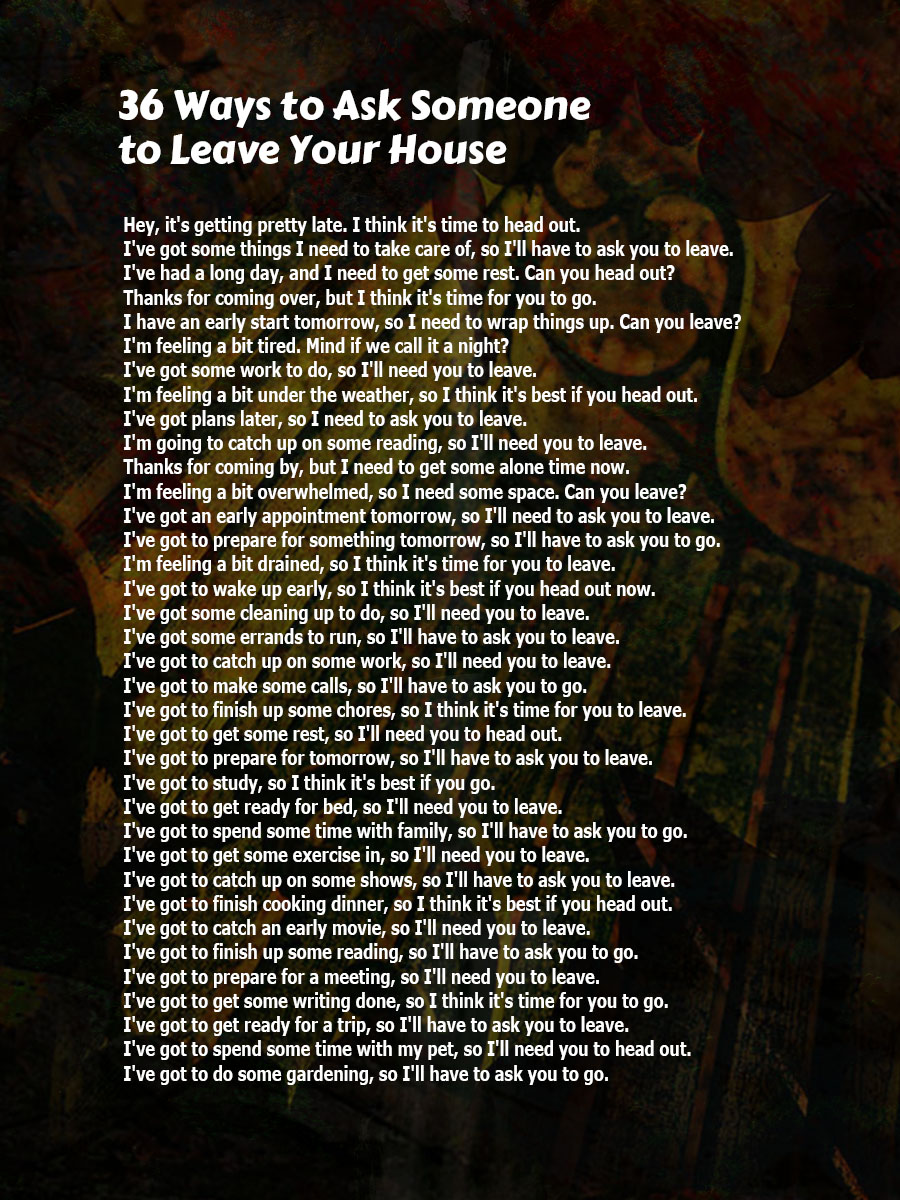Hello friends! Have you ever had someone over at your house for too long and didn’t know how to ask them to leave politely? Don’t worry, you’re not alone! Sometimes, we all need a gentle way to nudge our guests out the door without hurting their feelings.
That’s why I’ve put together this helpful guide with 36 easy and friendly ways to ask someone to leave your house. From subtle hints to direct but polite requests, you’ll find a variety of approaches to suit any situation.
So whether it’s a lingering visitor after a party or a friend who just won’t take the hint, these tips will help you navigate those awkward moments with grace and ease. Let’s make sure everyone leaves with a smile on their face!

Here are Ways to Ask Someone to Leave Your House:
- Hey, it’s getting pretty late. I think it’s time to head out.
- I’ve got some things I need to take care of, so I’ll have to ask you to leave.
- I’ve had a long day, and I need to get some rest. Can you head out?
- Thanks for coming over, but I think it’s time for you to go.
- I have an early start tomorrow, so I need to wrap things up. Can you leave?
- I’m feeling a bit tired. Mind if we call it a night?
- I’ve got some work to do, so I’ll need you to leave.
- I’m feeling a bit under the weather, so I think it’s best if you head out.
- I’ve got plans later, so I need to ask you to leave.
- I’m going to catch up on some reading, so I’ll need you to leave.
- Thanks for coming by, but I need to get some alone time now.
- I’m feeling a bit overwhelmed, so I need some space. Can you leave?
- I’ve got an early appointment tomorrow, so I’ll need to ask you to leave.
- I’ve got to prepare for something tomorrow, so I’ll have to ask you to go.
- I’m feeling a bit drained, so I think it’s time for you to leave.
- I’ve got to wake up early, so I think it’s best if you head out now.
- I’ve got some cleaning up to do, so I’ll need you to leave.
- I’ve got some errands to run, so I’ll have to ask you to leave.
- I’ve got to catch up on some work, so I’ll need you to leave.
- I’ve got to make some calls, so I’ll have to ask you to go.
- I’ve got to finish up some chores, so I think it’s time for you to leave.
- I’ve got to get some rest, so I’ll need you to head out.
- I’ve got to prepare for tomorrow, so I’ll have to ask you to leave.
- I’ve got to study, so I think it’s best if you go.
- I’ve got to get ready for bed, so I’ll need you to leave.
- I’ve got to spend some time with family, so I’ll have to ask you to go.
- I’ve got to get some exercise in, so I’ll need you to leave.
- I’ve got to catch up on some shows, so I’ll have to ask you to leave.
- I’ve got to finish cooking dinner, so I think it’s best if you head out.
- I’ve got to catch an early movie, so I’ll need you to leave.
- I’ve got to finish up some reading, so I’ll have to ask you to go.
- I’ve got to prepare for a meeting, so I’ll need you to leave.
- I’ve got to get some writing done, so I think it’s time for you to go.
- I’ve got to get ready for a trip, so I’ll have to ask you to leave.
- I’ve got to spend some time with my pet, so I’ll need you to head out.
- I’ve got to do some gardening, so I’ll have to ask you to go.
See Also: 35 Ways to Reply Back to Hope You Had a Great Weekend
Setting Boundaries
When it comes to hosting guests in your home, setting boundaries is essential. Being clear and direct about your expectations is key to ensuring a comfortable environment for everyone. Establishing time limits can also help promote a smooth and stress-free visit.
Being Clear And Direct
- Communicate openly without hesitations.
- Express your needs firmly but politely.
- Use “I” statements to convey your boundaries.
Establishing Time Limits
- Discuss expected duration of the visit upfront.
- Suggest a specific start and end time.
- Politely remind guests when it’s time to leave.
Distracting Techniques
When it’s time for someone to leave your house but you want to do it subtly, distracting techniques can be a great way to gently signal that it’s time to go without being too direct. So, let’s explore some subtle ways to guide your guest toward the door.
Suggesting Alternative Plans
One strategy to gently guide someone out of your house is to suggest alternative plans for them. You might subtly mention an early morning commitment you have or a busy day ahead, like “I have an early start tomorrow!” This can help set the expectation for an end time without directly telling them to leave.
Creating An Exit Strategy
An exit strategy can involve preparing an activity or task that makes it easier for your guest to transition out of your home. For example, you could start gathering their belongings, washing dishes, or even mentioning that you need to get some rest to subtly nudge them towards leaving.
Using Politeness
If you find yourself in a situation where you need to ask someone to leave your house, it’s important to handle it with politeness and respect. This will help maintain a positive relationship while still accomplishing your objective.
Expressing Gratitude
When asking someone to leave, expressing gratitude for their presence can soften the request and make the situation less awkward. Start by thanking them for coming and acknowledging their time spent with you.
For instance:
- Thank you so much for coming over, I really appreciate your visit.
By using polite language and expressing gratitude, you set a positive tone and make the other person feel valued, even if you’re asking them to leave.
Offering Help With Departure
Another way to ask someone to leave politely is by offering assistance with their departure. This shows that you’re considerate of their needs and want to facilitate a smooth exit for both parties.
You can say something like:
- Let me know if you need any help with getting your things together or finding your way home.
This not only signals your politeness but also indicates that you care about their well-being and want to ensure their comfort even as they leave.
Using politeness when asking someone to leave your house can help maintain a positive relationship while delivering your message effectively. By expressing gratitude and offering help with their departure, you show respect and consideration, ensuring a smooth transition and minimizing any potential discomfort.
Seeking Support
To seek support in asking someone to leave your house, consider expressing you need your space respectfully. Kindly discuss alternative arrangements while maintaining clear boundaries. It’s crucial to communicate honestly and empathetically during this challenging situation.
Enlist A Third Party
When all else fails and you find it difficult to communicate your concerns directly with the person overstaying their welcome, it may be helpful to enlist a third party to mediate the situation. This could be a mutual friend, a family member, or even a professional mediator. Having someone neutral and objective present can help ensure that everyone’s concerns are heard and respected.
Discussing Concerns With Others
If the overstaying guest is causing a significant disruption or making you feel uncomfortable, it can be beneficial to discuss your concerns with other individuals who are impacted by the situation. This could include your partner, other housemates, or even neighbors who may be affected by excessive noise or other disturbances. Sharing your experiences and seeking their support can provide you with the validation and encouragement necessary to address the issue.
See Also: 25 Friendly Responses When Someone Makes Fun of Your Name
Emergency Situations
In emergency situations where someone refuses to leave your house, it’s crucial to prioritize safety and take appropriate steps to ensure the well-being of yourself and others. Here are vital measures to handle such dire circumstances:
Maintaining Safety
- Assess the situation: Determine the severity of the emergency, such as aggressive behavior or potential harm, and act accordingly.
- Remain calm: Keeping a calm demeanor can help de-escalate the situation and allow for clearer decision-making.
- Set boundaries: Clearly communicate your boundaries and assert the need for the individual to leave your property.
- Seek assistance: If safety is compromised, prioritize making contact with external support.
Calling For Outside Assistance
- Contact law enforcement: If the situation escalates and you feel threatened, do not hesitate to call emergency services for immediate intervention.
- Inform trusted contacts: Reach out to trusted friends or relatives to seek support and ensure someone is aware of the situation.
- Consider legal counsel: In severe cases, legal representation may be necessary to tackle the situation effectively.
- Document the incident: Keep a record of the incident, including any threatening behavior or damage to property, for possible legal proceedings.

Conclusion
It’s essential to approach the situation with empathy and confidence when asking someone to leave your home. Utilize clear communication and set boundaries respectfully. Remember to prioritize your safety and well-being while maintaining respect for the other person. By employing these strategies, you can navigate this potentially awkward scenario with grace and assertiveness.









